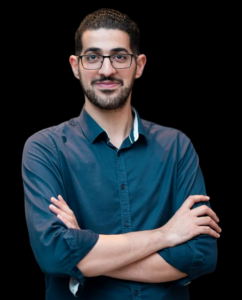Could a small Arab Israeli food delivery company run Wolt off the delivery road?

Two of the 5,000 delivery drivers employed by HAAT.
Eitan Leshem reports in Haaretz on 21 May 2025:
At a time when everyone is talking about Wolt, the Finnish food delivery giant acquired three years ago by DoorDash, an interesting rival has emerged here in Israel in the past five years. This delivery service didn’t start in the rich and well-fed big cities, but in the hungry and forgotten periphery of Israel. HAAT’s other edge? It found solutions to problems Wolt hasn’t – for example, homes without addresses, businesses without menus and customers who pay cash only.
HAAT (Arabic for bring) this month entered the market in the northern city of Haifa, where Wolt operates. In doing so, it provides a good opportunity to step back for a moment and try to understand how a small business from Umm al-Fahm has become one of the largest companies in Israel; a company that combines food with technology and has hundreds of thousands of customers – and aspirations to expand overseas. And all of this in the face of the difficulties the Arab community in Israel contends with.
Hasan Abasi, only 36 years old, was on the fast track to fulfilling any mother’s dream, whether Jewish or Arab. After he graduated with a bachelor’s degree in computer science and mathematics from Technion Israel Institute of Technology, Abasi went on to a master’s degree and then a Ph.D. – in total, a decade at the Technion in Haifa – during which he started to teach there himself. After completing his doctorate, he began working for high tech companies, including Intel, IBM and Google, in Tel Aviv and Zurich.
But then, with a small child and another one on the way (today, he and his wife are now expecting their fourth), Abasi returned home to be closer to his mother in his hometown: Umm al-Fahm. One evening, Abasi sought for his wife and himself one of the most basic things a young family can ask for – pizza delivery. Three hours after ordering it, the pizza had still not arrived, alerting him to a problem for which he could provide the solution.
“I saw a whole lot of challenges: Places without addresses, people paying in cash, restaurants without menus, without Wi-Fi or digital platforms, and I realized that someone was needed with a technological approach and knowledge to solve all of it,” says Abasi. “I looked around, searched and searched, and in the end found it myself.”
Abasi founded HAAT in 2018 and began offering service at the end of 2019. The delivery service first launched in Umm al-Fahm, a city in which finding an address means following instructions such as “100 meters after the grocery store, there’s a tree, turn left after that tree.”
“We started with nine restaurants, five delivery men, one city and four permanent employees. Within five years, we’ve grown to 3,000 restaurants in 40 cities – Arab, Jewish and mixed, with 5,000 delivery people and 250 regular employees. So you can say our strategy is working,” he says.

Hasan Abas, HAAT founder
Periphery first
“As a strategy, we decided to look for places where we bring value, so we started in the north, because when we started, the north was empty,” says Abasi. “We brought with us solutions that people were thirsting for, and they embraced us.” “Because of this, we aren’t in a hurry to reach places just so we could say ‘We’ve expanded,’ but really to reach places that are calling out to us and need our service, places where we can solve problems, such as in the periphery.”
Have you, in fact, solved the problems of the periphery or the Arab community?
“There’s clearly a difference between an Arab and a Jewish business, but the solution that we provide answers problems that are neither Jewish or Arab, but about the periphery versus the center [of the country]. For example, cash payment. Not long ago, I spoke with the German ambassador to Israel about this, and he told me that in Germany, there are two countries – the big cities and all the rest. Sounds familiar, right? He said that outside the big cities, 50 percent of the population uses only cash. That’s how it is in the Israeli periphery, and no platform really has a solution for that, except for us. That’s because we really grew out of these problems.”
How have you solved this?
“There are people who by definition are unbanked. For example, teenagers or people who are technology challenged.”
Or people in the black market.
“It doesn’t make a difference what the reason is. They don’t have a bank account. We enable them to buy digital products in cash, whether it’s a Netflix subscription or Fortnite coins. They order, they pay the delivery person in cash, and he gives them a code.
Another issue we’ve tackled is addresses. Using technology, we have succeeded in overcoming the problem, enabling people who live on unmapped streets to get service for the first time in their lives.
This isn’t exclusively a problem for the Arab community. Obviously, it’s a problem there, perhaps even in a higher percentage than anywhere else, but these are also problems for Haredi society and for remote communities.”
HAAT founder Hasan Abasi used his knowledge from completing a PhD at Technion to create a technology “enabling people who live on unmapped streets to get [delivery] service for the first time in their lives.”
Haifa is the first market you are entering where Wolt is already operating. Do you see them as direct competitors?
“They have already entered markets where we were there first, but in no case do we see ourselves as competitors. We compete first and foremost with ourselves. After all, they will come to Umm al-Fahm; it’s just a matter of time. I think all the big companies want to be everywhere. The question is how much they will succeed. They are a good company, and they deserve respect for many things, but I’m not interested in defeating them. I provide a similar service in some cases and completely other services in other cases, and there I feel like I’m not just representing a commercial company but actually contributing to the community.”

HAAT delivery drivers in Umm al-Fahm
Arab hamburgers, Jewish sushi
One simple truth emerged from the conversation with Abasi. Whether they are Arab or Jewish, come from Afula or Nazareth, Israelis love to order food, a lot of it. “There’s no fundamental difference in the number of purchases on the app between Arabs in the periphery and Tel Aviv. There are areas where over 30 percent of the population places an order every month. The average customer orders three times a month,” he says.
“The number of orders relates to the size of the population. Obviously, in Gush Dan [in the center], there are a lot more people, but in regards to the motivation to order out, it’s the same. We’ve also entered retail, and I was amazed – I couldn’t believe how many flowers you can sell through the app. And yet there are differences, I don’t deny it, and the periphery has disadvantages.”
Abasi points to the long distances between supermarkets and customers, or the large inventory they need to have available at all times, as some of the disadvantages of the periphery. There are also things that seem almost trivial, such as a computerized system that displays inventory, which is not possible due to the many small businesses he deals with.
“Here we stand out, because we give businesses that work with us a complete support system. We set up a computer system for them, connect it to Wi-Fi and design a financial plan for them. In the end, it gives us the advantage.”
Abasi contends that the “periphery first” approach, and perhaps also “small businesses first,” made the app immune to typical Israeli racism. This is how the company grew rapidly, especially in Acre during the war: It offered people locked in their homes a way to order products from the supermarket, and they jumped at the opportunity regardless of the name of the company’s CEO or the location of its headquarters.
“We’re an Arab company, but at the end of the day, we have Lior, our sales manager who works with Soujad, who is in charge of development, and Eyal Waldman as an investor, and Hasan as CEO. We are an all-Israeli company.”
Do you see a difference in the kind of orders placed by Arabs and Jews?
“Sure. First of all, it starts with the businesses themselves. Arabs often require much more help to enter the digital platform and in managing a computerized ordering system. Apart from that, there’s the food itself. Jews order a lot of sushi, while Arab order hamburgers and less Asian. In addition, if I, for example, compare Nazareth to Nof Hagalil, in Nazareth they order a lot more meat and in Nof Hagalil, more vegetarian and natural, again, with a strong bent toward Asian. But in the final analysis Jews and Arabs, everyone, loves to order food.”
HAAT, which launched five years ago, now works with more than 3,000 restaurants in Israel’s geographic periphery. Abasi may have started in the winding, nameless streets of Umm al-Fahm, but his dreams don’t end there. HAAT began a pilot project in Morocco that was halted by the Gaza war. “There are things I have no control over, and yes, there are places we can’t go into now because, at the end of the day, we are an Israeli company. The war affects us, too.”
He is again exploring expanding to other countries, using the same strategy as he used in Israel by entering markets through the backdoor – like the periphery of Greece.
But even with fancy new offices in Haifa, dreams of Europe and a plan to expand to Tel Aviv (“This will happen when the time is ripe”), Abasi is determined to use HAAT as a different kind of story.
“Yes, I want to be a model. A model of success, a positive story – in contrast to the bad things that reach the media out of Arab society. We are building dreams, allowing young people to look ahead and see a path that doesn’t involve crime or violence. That’s why I’m less interested in making money right now. I’m not rich, I’m an employee of my own company, and I feel like I’m making a revolution. That’s more fascinating and exciting than a few million in the bank.”
This article is reproduced in its entirety
